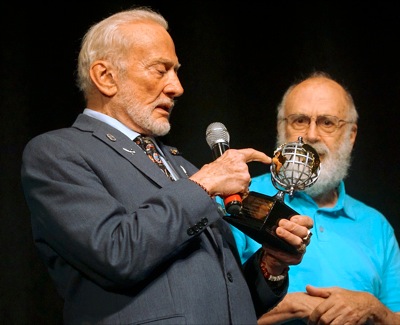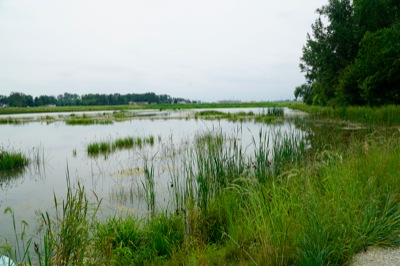Monday, July 24th, 2017
'Buzz' Aldrin lands in Wapak
Former astronaut speaks to huge crowds about moon landing, Neil Armstrong, space program
By Sydney Albert

Photo by Sydney Albert/The Daily Standard
Former astronaut Edwin "Buzz" Aldrin speaks at the Wapakoneta Performing Arts Center on Saturday as part of the Summer Moon Festival. Aldrin spoke about the moon landing, his colleagues who worked to make the landing happen and the stories behind famous photos taken during the trip.
WAPAKONETA - The second man to walk on the moon drew standing-room-only crowds on Saturday at the Wapakoneta Performing Arts Center as people filled the chairs and lined the walls to hear him speak.
Edwin "Buzz" Aldrin, the 87-year-old former astronaut, visited Wapakoneta during Armstrong Air and Space Museum's Summer Moon Festival to celebrate the 48th anniversary of the Apollo 11 moon landing and to share some experiences and his thoughts about the future of space exploration.
Aldrin said he had decided early on that if space was going to be humanity's next frontier then he wanted to be a part of it. He was determined despite the rejection of his first application to become an astronaut. After all, as President John F. Kennedy would later say, "We do these things not because they are easy, but because they are hard."
During the 1960s, many people thought landing on the moon would be impossible, but Aldrin described Kennedy as a leader with the vision, determination and courage to see the project through. When work first started on the project, nobody was entirely sure how successful the mission would be. Yet Aldrin said that when he stepped onto the surface of the moon with fellow astronaut Neil Armstrong, it was a credit to "human magnificence" that he was there at all.
"What we saw was about the most desolate scenery a person could ever imagine," he said.
Due to the brightness of the sun's reflection, Aldrin couldn't see any stars on the horizon, and the pockmarked surface of the moon offered no signs of life.
"There is nothing you could imagine here on Earth as magnificent and as desolate," he said.
He said the dust covering the moon's surface was "like nothing you could find here." Upon close inspection, Aldrin said it was very fine, fractured glass, and the footprints left in it were some of the finest he had ever seen.
"Back on Earth, everybody felt that they had participated in this incredible journey, and we went around the world and people welcomed us as heroes," he said. "But we knew that they weren't really cheering for three guys (Armstrong, Aldrin and pilot and crew mate Michael Collins). It was what we represented, and what we represented was a team, the world coming together and that we had accomplished the impossible, and the true value of the Apollo (program) is the amazing story of innovation and teamwork that overcame many obstacles to reach the moon."
The future of America's space program has come into question with the National Aeronautics and Space Administration facing billions of dollars in budget cuts. However, Aldrin continues to advocate for it, saying the research and technological advances that have come from the space program have helped improve lives all over the world.
"For example, cellphones, TV, global positioning, medical advances - many of these things would just not have been possible without the space program," Aldrin said. "Professor Stephen Hawking recently said, 'We've made remarkable progress in the last hundred years, but if we want to continue, our future is in space.' I couldn't agree more."
Though he may not be around to see many of the advances yet to come, Aldrin said he wants to move the program in the right direction. He envisions a human settlement on Mars and has written books for adults and children explaining his ideas of how such a settlement might work. He hopes to inspire the younger generation, because they're the ones who will be in charge of making that journey someday.


